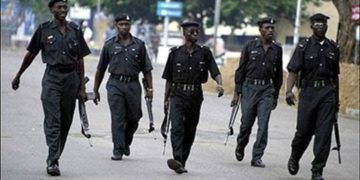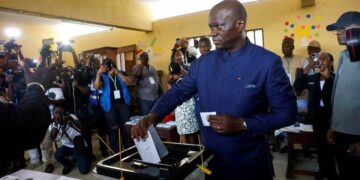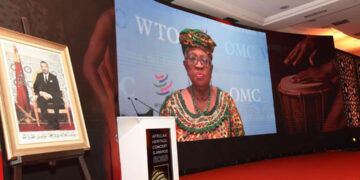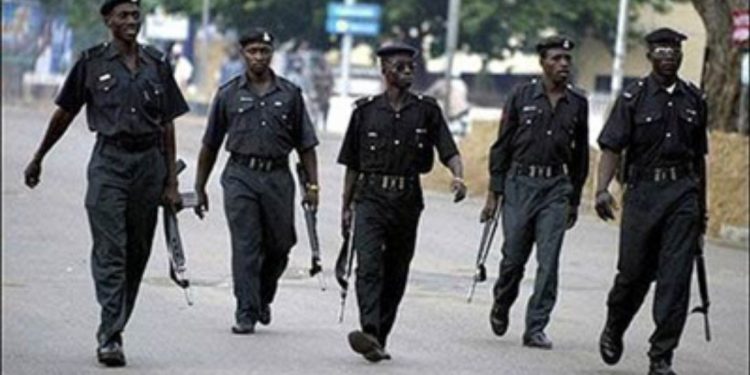By Olusegun Adeniyi
Police, I doubt there is any Nigerian on WhatsApp who has not watched the 86-second video clip of four policemen rummaging through a burnt station and the emotion-laden speech of one of the officers. With his name tag and service number visible, the leader of the group said, “Good morning fellow Nigerians. See what happened to us in Gujba. In Gujba there was an attack on 17 June 2021.
They killed my colleagues. They killed four. See us [that] survived today – look at how they burnt our things, look at what they burnt.” When shown an item found in the debris by one of his colleagues, he asked that it be packed for him before he continued his speech.
“Since we came for this operation in Yobe State, since December to June [today] making it seven months, no feeding, no allowance, nothing. Because of the N65,000 I am collecting in the Nigerian Police as a sergeant—N65,000, as a sergeant—I am dying in Yobe, here. Look at how they burnt our things—look at how many people have died,” and he broke down, sobbing. “Nigerians, look into our problem—we are dying, no helper. What are we serving this country for? Why? Nothing—hungry servicemen! God is there… Thank you.”
If there is any take-away from the video, it is the helplessness of the men and officers constitutionally charged with maintaining public order and safety as well as preventing, detecting, and investigating criminal activities in the country. Perhaps nothing depicts this situation better than the picture of a police station in one of the Southeast states where a notice was hung by the entrance: “This station closes by 7pm due to the current security situation in the country.”
While the inability of the police to perform satisfactorily is often blamed on acute manpower shortage, the challenge goes beyond numbers. Unmotivated and ill-equipped, most of their personnel have become easy game for a more sophisticated world of crime. With hundreds of policemen and officers killed not in the line of duty but execution style, questions must be asked about why those who are supposed to protect the rest of us can no longer protect themselves from criminal gangs.
That then accounts for why Nigeria is ranked the third most insecure nation, just two steps above Somalia at fifth by the Global Terror Index. Rather than deal with this systemic problem, we simply draft in soldiers to perform police functions of internal security in practically all the states of the federation.
What we are witnessing is the consequence of decades of neglect pertaining to recruitment, welfare, training, and equipping of the police. Last Sunday, a report in PUNCH newspaper revealed that key tracking equipment deployed by the police to go after kidnappers, bandits and terrorists has remained inactive since the beginning of the year. Yet we expect them to perform miracles. But before I go further, it is important I explain the title of this column, taken from the warning given 35 years ago by Alozie Ogugbuaja, which went unheeded. Ogugbuaja, by the way, was head of public relations at the Lagos State Police Command in 1990’s. Young, handsome, and brilliant, Ogugbuaja remains the Gold Standard in police public relations. But an otherwise glorious career was terminated by a train of events over which he had little control.
READ ALSO: Nigeria: NCDMB Lauds President Tinubu Oil Sector’s Executive Orders For Reinforcing NOGICD Act, SLA
It all started on 23rd May 1986 when a detachment of mobile policemen was invited to the campus of the Ahmadu Bello University (ABU) Zaria, following a peaceful ‘Ango Must Go’ demonstration against their Vice Chancellor, Prof Ango Abdullahi (now chairman of Northern Elders). Under circumstances that remain unclear, the trigger-happy policemen killed four female students and injured several others. When the media reports that followed claimed there was a massacre at the campus, the embattled VC said “only four students” were killed.
That triggered a nationwide student riot that went violent on some campuses, including at the then University of Ife (later Obafemi Awolowo University) where this reporter was a ‘Jambite’ (first year undergraduate). For taking the demonstration to the prison in town and setting the captives free, our campus was subsequently closed for five months and 11 days by General Ibrahim Babangida. On resumption, each student was required to submit a letter from their parents, promising good behaviour!
In the aftermath of that crisis, Babangida instituted a panel of inquiry headed by the late Justice Mustapha Akanbi which sat in Lagos. Ordinarily, it was the Lagos State Police Commissioner who was supposed to testify but somehow, he sent his PRO. In a brutal disquisition of how the police had been left to rot by the military, Ogugbuaja said many things. These were his most memorable words: “The Army is the unregistered political party of Nigeria…quietly behind closed doors, they can decide to increase their salaries while policemen have become glorified ordinary men. Since the military had come into politics in Nigeria, it will not be in its interest to have an effective and efficient police force because an efficient and effective police force is capable of foiling a military coup…. On a weekday, you see Lieutenants, Captains, Majors, Colonels, Brigadiers drinking pepper soup and beer at mid-day…no wonder they have time to plan coups. We used to say idle civilians, now we have idle soldiers.” Ogugbuaja then threw the bombshell from which I picked the title of this column: “If you want a good policeman, you will have to pay for it. If you want a cheap one, Made-in-Taiwan, you will get it.”
The next day, the media went to town with screaming headlines about “Peppersoup Generals”. That marked the beginning of the end of a brilliant career for Ogugbuaja who never recovered from the punitive deployments that followed. For the Twitter generation that may not understand what the phrase ‘Made-in-Taiwan’ meant, let me also explain. At the early period of their industrialisation, manufactured products from this highly developed Chinese territory were cheap in price but low on quality, though that soon changed with time. So, the term ‘Made-in-Taiwan’ was a derogatory Nigerian slang in the eighties and nineties to depict a lack of standard in goods or services. To extrapolate from that, we can infer that what we had then, and perhaps even now, is a police force that is not fit for purpose. So it is little wonder that our country has been overwhelmed by sundry criminal cartels. In the first half of this year, between January and June, no fewer than 2,943 people were kidnapped, according to Nigeria Security Tracker (NST) with 5,800 killings recorded during the same period. But the greater challenge is the number of policemen who are being mowed down by criminals on a daily basis.
Let’s be clear. Crime fighting is a risky enterprise all over the world. Fatalities among police personnel are not unusual, even in developed societies. Last month, the Federal Bureau of Investigation (FBI) Director, Christopher Wray told the House Oversight Committee that a total of 37 officers had been murdered in the first five months of 2021 in the United States, compared with 46 during all of 2020. “And that’s not counting all those officers who’ve died in the line of duty facing the countless other inherent dangers of the job, like from a car accident in pursuit after a subject or drowning during an attempted rescue. Or even the scores of officers who’ve died from Covid-19. Because, of course, law enforcement kept coming to work every day despite the pandemic,” Wray said.
However, what is different in our case is that while police officers die in the line of duty elsewhere, criminals now target police officers for extermination in Nigeria without fear. In answering the question, ‘Why does the Mafia have a rule against killing cops?’, Vivek Tulja, a satellite communication expert, gave some interesting examples as to why criminals generally avoid killing policemen, unless cornered. He concluded “if you happen to kill a cop, you are best off using the last bullet in your magazine on yourself.” Not in our country, I must say. But who do we blame?
In successive United Nations assignments, the Nigerian police contingent has repeatedly stood out for distinction. But back home, things are different, raising pertinent questions. At a public policy dialogue on ‘Policing and Human Rights in Nigeria’ last year, the National Human Rights Commission (NHCR) Executive Secretary, Mr Tony Chukwu said “It is well known that whenever our police officers go outside this country for international operations, they excel” before asking, “So, what is the missing gap?” He answered his own question: “The missing gap is just that the climate of operation; the condition under which they operate over there predisposes them to excellence, but the condition under which they operate here creates the challenge they have.”
Former Deputy Senate President, Ike Ekweremadu conceded on Monday in Lagos that “Our policing system has failed woefully” and that “It is no surprise that with the capsizing of the national police, the nation’s security has also collapsed.” But his prescription begs the issue. “In an instance where we have decentralized police, we will have a federal police system and 774 police systems in all the 774 local governments in the 36 states and in Abuja. The implication, therefore, is that if the federal police fail, we have additional layers in 36 states; but right now, they are absent,” said Ekweremadu. “Now that federal policing has collapsed because they do not have the resources, the funding, and the manpower, there is nothing to hold on to.”
While in principle, I subscribe to the idea of state police, what ails us requires more rigour. When we create a multiplicity of police forces whose personnel are neither well trained nor properly remunerated, they are likely to embody the worst vices of society. As Ogugbuaja warned 35 years ago, the choice of the kind of police force we want is ours. Sadly, we went for the ‘Made-in-Taiwan’ option. Ordinarily, that was not bad in itself; afterall, the Republic of China (as the Chinese territory is called) improved on its technology to create what later became the ‘Taiwan Miracle’ and joined Singapore, South Korea and Hong Kong to make the elite ‘Four Asian Tigers’. But like we have done to other critical institutions in Nigeria, we allowed the police to degenerate as an institution, abandoned its personnel to their fate and now we are in serious danger.
The current security challenge facing the nation was the thrust of the interventions at the 2nd Shinkafi Intelligence and Security Summit (SISS) held on Tuesday in Abuja with the theme, ‘Socio-economic implications of kidnapping and banditry in Nigeria’. Held in honour of the late Marafan Sokoto who had an illustrious career in the police and security services, some of the conclusions included the need to close the inequality gap, improve intelligence gathering, motivate law enforcement officers through both welfare and equipment and retool the entire security architecture. In the case of the police, there is indeed an urgent need for a complete reorientation. While most of our communities are unpoliced or under-policed, with criminals now seizing traditional rulers right inside their palaces, it is shameful that almost half the population of their personnel are carrying handbags for the wives of rich musicians and comedians, federal and state legislators, private businessmen, government contractors, and renowned motor park touts.
My position on restructuring is very clear and has been well made on this page. But it is not a silver bullet for the challenges of Nigeria. We need to look at the police in a more holistic manner to address fundamental problems. Creating layers of police authorities at a period we are spending 97 percent of earnings on debt servicing and relying on more borrowings to stay afloat could become a huge security burden. If you put guns in the hands of people with no resources to pay them, chances are that they will “use what they have to get what they want”, to adapt a popular street lingo. And when that happens in a nation replete with mutual ethno-religious suspicions, we may be carrying the luck—which the president admits is what has kept us together—too far!
Army and Lesson from Police Council
The major highlight of last week’s decisions by the Police Service Commission (PSC) was not the recommendation on the promotion of certain officers as prominently reported in the media but rather the decision to seek justice for some aggrieved officers. It is a lesson that will serve the military authority that has consistently ignored court judgements on how it subverted own rules to unjustly terminate the career of 38 military officers. Aside lifting the suspension placed on one police officer, the PSC also approved the reinstatement of 21 others and directed the promotion of some of these police officers to the next rank before the payment of their salary arrears and other entitlements.
Meanwhile, in the army, 38 officers comprising nine Major Generals, 10 Brigadier Generals, seven Colonels, 11 Lieutenant Colonels and a Major were compulsorily retired in 2016 in a controversial exercise that divided the country and led to sectional charge against the then Chief of Army Staff, Lt General Tukur Buratai. The premature retirement was premised on services rules which prescribe such on “discipline grounds i.e. serious offences”. But the procedures for establishing what constitutes a serious offence within the armed forces begin with reporting, arraigning the officer(s) concerned, and upon conviction (if found guilty), sending the report to the Army Council. In the case of the 38 officers, none of these procedures was followed before their retirement was announced in a most cynical manner that tarnished their reputation and the army they served. Some of these officers were never queried or confronted with any allegations of misconduct while one of them was abroad, on a national assignment, when he learnt about his retirement from the media.
With the confirmation of Major General Farouk Yahaya as Chief of Army Staff by the Senate, I hope he will seek justice for the 38 officers in the manner the Police have done. I am not canvassing that those who have been out of uniform for almost five years (even though not of their making) should be brought back to the army. But they deserve honourable discharge at appropriate ranks with all their entitlements fully paid. Until justice is availed the 38 officers, the abuse of power and process that led to their premature retirement will continue to be a serious indictment on the Nigerian army.
Mrs Folorunsho Alakija at 70
The Executive Vice Chairman of Famfa Oil, Mrs Folorunsho Alakija is 70 today and I wish her a very happy birthday.
Ordinarily, when we plan the Annual Teens conference of our church, we begin with the speakers before identifying the theme. But in 2018, we chose the theme, “If you can dream it, you can make it happen’, before we began thinking about possible speakers. Around the period, I read an interview by Mrs Alakija on the battles she fought to secure her oil license and I felt she was the kind of person we would love to have speak to the teenagers that year.
Determined to try, I Googled and found an office contact that eventually led me to her PA with whom I began to exchange mails. At the end, Mrs Alakija accepted the request, came from Lagos with a retinue of aides (which must have cost a fortune) and the teenagers were really blessed by her presence. Meanwhile, the only personal contact I have ever had with her was the brief handshake we exchanged on the day of the conference. No other contact before or after that day! It takes somebody passionate about making a difference in the lives of others to do what she did for people she had no relationship with, and I cannot forget that.
At the conference, Mrs Alakija defined dream not only as a cherished aspiration but also an imagination of that which one would wish to happen. She then identified three categories of dreamers. The first are the ‘wishful dreamers’ otherwise called day dreamers–people who indulge themselves in mere fantasy. We have a huge population of those people in Nigeria today. That conclusion I must state is mine, not hers! The second category she identified belongs to ‘night dreamers’ who sleep and remember that something that does not necessarily bear any semblance to the reality of their existence happened in their subconscious. Mrs Alakija then focused on the last category, comprising those she labelled ‘action dreamers’. These are people who stretch their horizon beyond every conceivable limitation. They are most often considered unrealistic, eccentric, or erratic but they know where they are going, and nothing would stop them from reaching their goals. The fact that we have a few of such people in Nigeria today is why we are where we are. That conclusion, I must also add, is mine!
Citing her 12-year legal battle with the federal government over OPL 216, Mrs Alakija said a certain level of tenacity is needed for those who dream big. “Dreams motivate, inspire and improve us. Dreams are important because without them, life would be meaningless,” she told the teenagers in Abuja on 17th August 2018.
From Mrs Alakija’s life story, it is obvious that she is an ‘action dreamer’. As she celebrates her Jubilee year and joins the elite class of septuagenarians, I wish her happy birthday, long life, and good health. May she continue to dream big.
Meanwhile, registration for the 2021 edition of the annual teens career conference with the theme, ‘A Brave New World: Who Dares, Wins!’ continues both for physical and online attendance. The speakers are Chairman, Talent City Inc, Mr Iyinoluwa Aboyeji, Co-founder and Chief Growth Officer, MAX.NG, Mr Chinedu Azodoh and Group Managing Director (Nigeria), NewGlobe Education, Mrs Omowale David-Ashiru. Like previous editions, it will bring together teenagers from Abuja and its environs to listen to expert advice on career choices in today’s dynamic and challenging world. For details on the conference, interested teenagers should visit www.rccgteapteens.org.
• You can follow me on my Twitter handle, @Olusegunverdict and on www.olusegunadeniyi.com

































